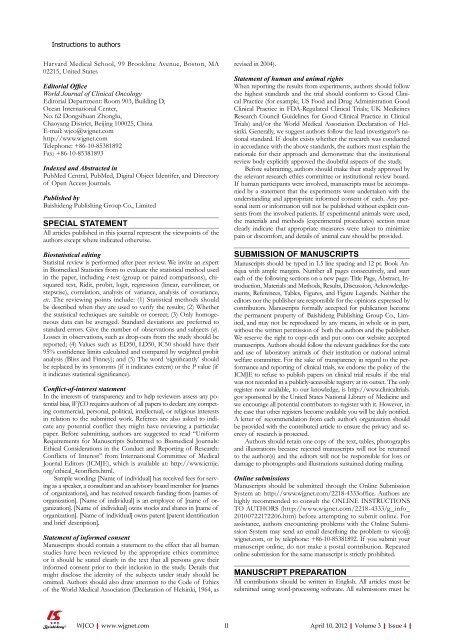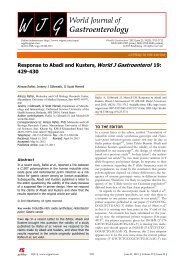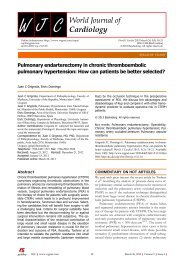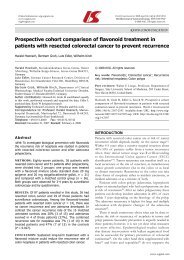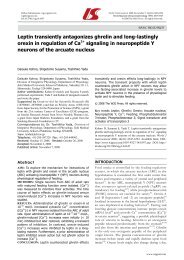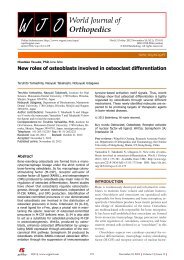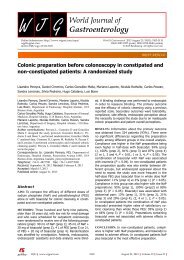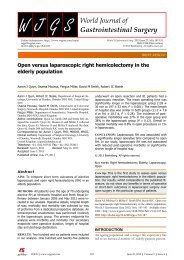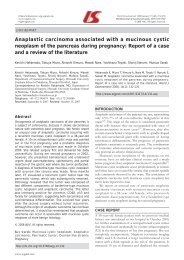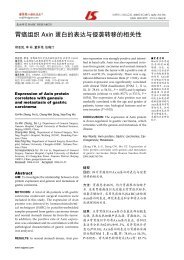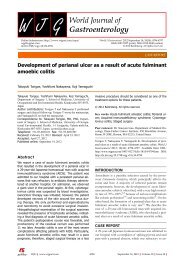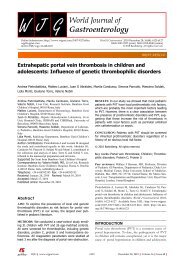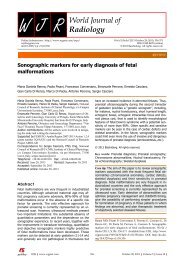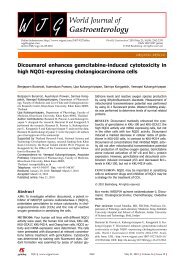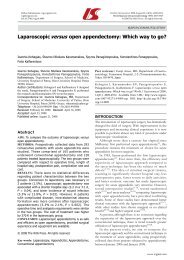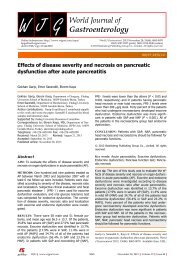World Journal of Clinical Oncology
World Journal of Clinical Oncology
World Journal of Clinical Oncology
Create successful ePaper yourself
Turn your PDF publications into a flip-book with our unique Google optimized e-Paper software.
Instructions to authors<br />
Harvard Medical School, 99 Brookline Avenue, Boston, MA<br />
02215, United States<br />
Editorial Office<br />
<strong>World</strong> <strong>Journal</strong> <strong>of</strong> <strong>Clinical</strong> <strong>Oncology</strong><br />
Editorial Department: Room 903, Building D,<br />
Ocean International Center,<br />
No. 62 Dongsihuan Zhonglu,<br />
Chaoyang District, Beijing 100025, China<br />
E-mail: wjco@wjgnet.com<br />
http://www.wjgnet.com<br />
Telephone: +86-10-85381892<br />
Fax: +86-10-85381893<br />
Indexed and Abstracted in<br />
PubMed Central, PubMed, Digital Object Identifer, and Directory<br />
<strong>of</strong> Open Access <strong>Journal</strong>s.<br />
Published by<br />
Baishideng Publishing Group Co., Limited<br />
SPECIAL STATEMENT<br />
All articles published in this journal represent the viewpoints <strong>of</strong> the<br />
authors except where indicated otherwise.<br />
Biostatistical editing<br />
Statisital review is performed after peer review. We invite an expert<br />
in Biomedical Statistics from to evaluate the statistical method used<br />
in the paper, including t-test (group or paired comparisons), chisquared<br />
test, Ridit, probit, logit, regression (linear, curvilinear, or<br />
stepwise), correlation, analysis <strong>of</strong> variance, analysis <strong>of</strong> covariance,<br />
etc. The reviewing points include: (1) Statistical methods should<br />
be described when they are used to verify the results; (2) Whether<br />
the statistical techniques are suitable or correct; (3) Only homogeneous<br />
data can be averaged. Standard deviations are preferred to<br />
standard errors. Give the number <strong>of</strong> observations and subjects (n).<br />
Losses in observations, such as drop-outs from the study should be<br />
reported; (4) Values such as ED50, LD50, IC50 should have their<br />
95% confidence limits calculated and compared by weighted probit<br />
analysis (Bliss and Finney); and (5) The word ‘significantly’ should<br />
be replaced by its synonyms (if it indicates extent) or the P value (if<br />
it indicates statistical significance).<br />
Conflict-<strong>of</strong>-interest statement<br />
In the interests <strong>of</strong> transparency and to help reviewers assess any potential<br />
bias, WJCO requires authors <strong>of</strong> all papers to declare any competing<br />
commercial, personal, political, intellectual, or religious interests<br />
in relation to the submitted work. Referees are also asked to indicate<br />
any potential conflict they might have reviewing a particular<br />
paper. Before submitting, authors are suggested to read “Uniform<br />
Requirements for Manuscripts Submitted to Biomedical <strong>Journal</strong>s:<br />
Ethical Considerations in the Conduct and Reporting <strong>of</strong> Research:<br />
Conflicts <strong>of</strong> Interest” from International Committee <strong>of</strong> Medical<br />
<strong>Journal</strong> Editors (ICMJE), which is available at: http://www.icmje.<br />
org/ethical_4conflicts.html.<br />
Sample wording: [Name <strong>of</strong> individual] has received fees for serving<br />
as a speaker, a consultant and an advisory board member for [names<br />
<strong>of</strong> organizations], and has received research funding from [names <strong>of</strong><br />
organization]. [Name <strong>of</strong> individual] is an employee <strong>of</strong> [name <strong>of</strong> organization].<br />
[Name <strong>of</strong> individual] owns stocks and shares in [name <strong>of</strong><br />
organization]. [Name <strong>of</strong> individual] owns patent [patent identification<br />
and brief description].<br />
Statement <strong>of</strong> informed consent<br />
Manuscripts should contain a statement to the effect that all human<br />
studies have been reviewed by the appropriate ethics committee<br />
or it should be stated clearly in the text that all persons gave their<br />
informed consent prior to their inclusion in the study. Details that<br />
might disclose the identity <strong>of</strong> the subjects under study should be<br />
omitted. Authors should also draw attention to the Code <strong>of</strong> Ethics<br />
<strong>of</strong> the <strong>World</strong> Medical Association (Declaration <strong>of</strong> Helsinki, 1964, as<br />
WJCO|www.wjgnet.com<br />
revised in 2004).<br />
Statement <strong>of</strong> human and animal rights<br />
When reporting the results from experiments, authors should follow<br />
the highest standards and the trial should conform to Good <strong>Clinical</strong><br />
Practice (for example, US Food and Drug Administration Good<br />
<strong>Clinical</strong> Practice in FDA-Regulated <strong>Clinical</strong> Trials; UK Medicines<br />
Research Council Guidelines for Good <strong>Clinical</strong> Practice in <strong>Clinical</strong><br />
Trials) and/or the <strong>World</strong> Medical Association Declaration <strong>of</strong> Helsinki.<br />
Generally, we suggest authors follow the lead investigator’s national<br />
standard. If doubt exists whether the research was conducted<br />
in accordance with the above standards, the authors must explain the<br />
rationale for their approach and demonstrate that the institutional<br />
review body explicitly approved the doubtful aspects <strong>of</strong> the study.<br />
Before submitting, authors should make their study approved by<br />
the relevant research ethics committee or institutional review board.<br />
If human participants were involved, manuscripts must be accompanied<br />
by a statement that the experiments were undertaken with the<br />
understanding and appropriate informed consent <strong>of</strong> each. Any personal<br />
item or information will not be published without explicit consents<br />
from the involved patients. If experimental animals were used,<br />
the materials and methods (experimental procedures) section must<br />
clearly indicate that appropriate measures were taken to minimize<br />
pain or discomfort, and details <strong>of</strong> animal care should be provided.<br />
SUBMISSION OF MANUSCRIPTS<br />
Manuscripts should be typed in 1.5 line spacing and 12 pt. Book Antiqua<br />
with ample margins. Number all pages consecutively, and start<br />
each <strong>of</strong> the following sections on a new page: Title Page, Abstract, Introduction,<br />
Materials and Methods, Results, Discussion, Acknowledgements,<br />
References, Tables, Figures, and Figure Legends. Neither the<br />
editors nor the publisher are responsible for the opinions expressed by<br />
contributors. Manuscripts formally accepted for publication become<br />
the permanent property <strong>of</strong> Baishideng Publishing Group Co., Limited,<br />
and may not be reproduced by any means, in whole or in part,<br />
without the written permission <strong>of</strong> both the authors and the publisher.<br />
We reserve the right to copy-edit and put onto our website accepted<br />
manuscripts. Authors should follow the relevant guidelines for the care<br />
and use <strong>of</strong> laboratory animals <strong>of</strong> their institution or national animal<br />
welfare committee. For the sake <strong>of</strong> transparency in regard to the performance<br />
and reporting <strong>of</strong> clinical trials, we endorse the policy <strong>of</strong> the<br />
ICMJE to refuse to publish papers on clinical trial results if the trial<br />
was not recorded in a publicly-accessible registry at its outset. The only<br />
register now available, to our knowledge, is http://www.clinicaltrials.<br />
gov sponsored by the United States National Library <strong>of</strong> Medicine and<br />
we encourage all potential contributors to register with it. However, in<br />
the case that other registers become available you will be duly notified.<br />
A letter <strong>of</strong> recommendation from each author’s organization should<br />
be provided with the contributed article to ensure the privacy and secrecy<br />
<strong>of</strong> research is protected.<br />
Authors should retain one copy <strong>of</strong> the text, tables, photographs<br />
and illustrations because rejected manuscripts will not be returned<br />
to the author(s) and the editors will not be responsible for loss or<br />
damage to photographs and illustrations sustained during mailing.<br />
Online submissions<br />
Manuscripts should be submitted through the Online Submission<br />
System at: http://www.wjgnet.com/2218-4333<strong>of</strong>fice. Authors are<br />
highly recommended to consult the ONLINE INSTRUCTIONS<br />
TO AUTHORS (http://www.wjgnet.com/2218-4333/g_info_<br />
20100722172206.htm) before attempting to submit online. For<br />
assistance, authors encountering problems with the Online Submission<br />
System may send an email describing the problem to wjco@<br />
wjgnet.com, or by telephone: +86-10-85381892. If you submit your<br />
manuscript online, do not make a postal contribution. Repeated<br />
online submission for the same manuscript is strictly prohibited.<br />
MANUSCRIPT PREPARATION<br />
All contributions should be written in English. All articles must be<br />
submitted using word-processing s<strong>of</strong>tware. All submissions must be<br />
II April 10, 2012|Volume 3|Issue 4|


